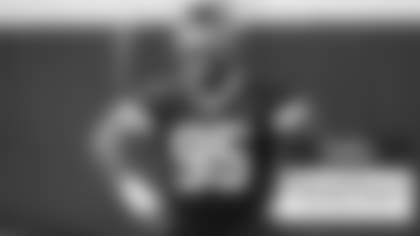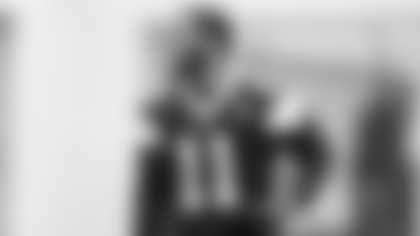they're going to put pressure on the players you're trying to get the ball to.
"It comes down to you have to maybe help your guys once in a while, but at the end of the day, you got to block 'em."
The men of the hour Monday night will be the Cowboys' two offensive tackles, Flozell Adams on the left side and Marc Colombo on the right side. The match-ups will be Adams vs. Umenyiora, who led the NFC last year with 14½ sacks, and Colombo vs. Strahan, whose 130.5 career sacks leaves him 2½ sacks from overtaking Lawrence Taylor as the Giants' all-time sack leader and moving into seventh place all-time in the NFL ahead of Taylor and Leslie O'Neal.
Also, realize this: Of the seven sacks the Giants totaled in the two games last year against the Cowboys, Strahan had four of them and Umenyiora had two.
Now Colombo, for the most part, has been one of the team's most consistent offensive linemen over the first five games this year. This, obviously, will be a huge test, and the Cowboys need him to grade out high.
Adams has been a tad inconsistent returning from last year's reconstructive knee surgery, and then missing far too much time in training camp recovering from a strained calf. At times he's been good, at times he's been a no-show. The Cowboys can't win if the latter Adams shows up Monday night.
"Marc and Flo have to block one-on-one, and I have confidence they can do it," says Bledsoe, who had been sacked 12 times in five games - nine coming in the two losses. "If you have to help both tackles all the time, then you are running three-man patterns."
That's the problem the Cowboys got into much of the second half of last season after Adams was lost in the first Giants game, Game 6. While they spent time helping rookie right tackle Rob Petitti in the early part of the season, their dilemma the final 10 games was just who to help since Torrin Tucker took over at left tackle, a position he had never played.
The Cowboys tried to spread the help, but look what happened: The sacks went from an average of two a game over the first five games to nearly four a game over the final 11. Their point total, and this is no coincidence, went from 24.2 in the first five to 18.5 the last 11.
Picking up blitzes is one thing, but offensive tackles doing their jobs is entirely another. Because if they aren't, and the Giants can apply pressure without blitzing - even linebackers as Philadelphia did - then your passing game will go to pot, the defense having far too many guys to cover your few receivers.
"They mix it up a little bit," Parcells said of the Giants defensive attack. "They'll blitz you part of the time and they'll twist and stunt a little bit to get their guys free. But the thing that we concern ourselves with is that they have good players doing it.
"All defenses will blitz you part of the time, and they're the same way. I'm sure if they go back and watch our game against the Eagles, they'll come after us more because they'll feel like we didn't handle it very well. But the big thing is, when you have Strahan and Umenyiora, LaVar Arrington, and you have these guys who all can bring pressure just as individual pass-rushers, that's a big challenge in and of itself. So there are two things that we have to do: No. 1, we have to identify what's coming, and we have to be able to hold up individually against those guys."
Here is what squares this dilemma. The Giants are putting points on the board. Twice they've scored 30. Only once have they scored less than 20, but just barely, beating Washington, 19-3. They average 25.4 points a game. So you can't play a little cozy offense just to protect your quarterback. You can't just run the ball, because once the defense recognizes that, it starts to squeeze you.
Bottom line:
Block 'em and take care of the football.
Remember those two things.
"Because at the end of the day," Parcells said after ticking off all the things you can do to either counter the blitz or help with disruptive players, "you got to block 'em."
And then there is this: "The quarterback who doesn't know how to throw the ball away is going to get sacked," Parcells says. "The thing here to try to teach the player, not to be





